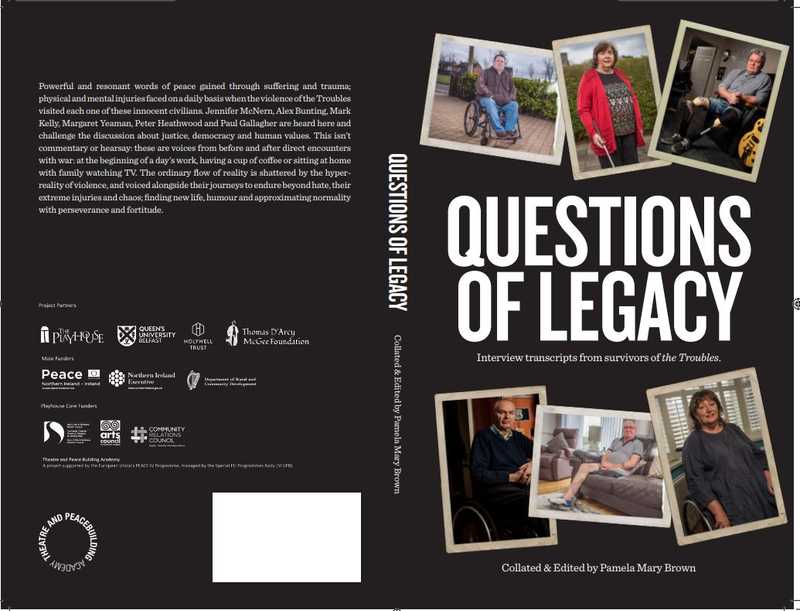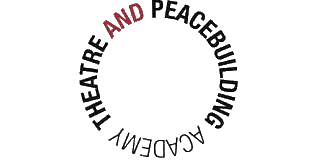Podcasts
The Theatre Peace Building Academy project came to an end in September 2020. Questions of Legacy was an umbrella project that created a ‘narrative archive’ demonstrating how the production of podcasts (with accompanying publication) promotes understanding, empathy and reconciliation. The interviews demonstrate how mutual listening creates a dialogue about the past in the present towards the path forward.
Six members from the Belfast WAVE trauma group took part in the podcast interviews. Carefully selected poems were used in discussion to springboard ‘legacy’ questions. Significantly, Primo Levi’s ‘The Survivor’ and a contemporary piece by a son writing about his father having lost a leg due to a punishment beating. The participant’s response to both poems was extraordinary.
SELECTING THE QUESTIONS: 36 questions; twelve from the past, twelve from the present, and twelve about the future. During the interviews—while it was a collective endeavour in the creation of the questions—no participant knew which question they would be asked. These were selected at random from cards, ensuring a spontaneous and unrehearsed response.
The interviews were peer-led, pairing-off the participants to interview each other. I had several reasons for this approach, and primarily due to the fact that the participants were aware of the nuances of each other’s story. They could draw out essential detail during the recordings. The podcasts were transcribed for an accompanying book. Composition of music for podcasts in conjunction with composer Connor Kelly.
Jennifer McNern, Alex Bunting, Mark Kelly, Margaret Yeaman, Peter Heathwood and Paul Gallagher, members of WAVE Trauma, Belfast and civilians injured during the Troubles. Their voices are from before and after these direct encounters: the beginning of a day’s work, having a cup of coffee, or sitting at home with family watching TV. The ordinary flow of reality shattered by the hyper-reality of violence, and their voices alongside their journeys to endure beyond hate, existing and living with their extreme injuries and the chaos; finding new life, humour, and approximating ‘normality’ with perseverance and fortitude.
Jennifer McNern on the fourth of March 1972 was injured by a no warning bomb in the Abercorn restaurant in Belfast City Centre. She lost both her legs and had other serious fractures to her body.
PAST: What supports were in place when you were injured? Do you ever think ‘what if?’ and ‘why me?’ PRESENT: Injured and disabled victims by atrocities during the troubles are considered low grade inquires, not important enough for investigation. Agree or disagree? Is there a question centred upon what happened to you that continually nags you day and night? FUTURE: When is it okay to stop talking about something? How can your voice carry into the future?
Alex Bunting was blown up on the twenty-first of the tenth 1991, he lost his left leg, and sustained injury to his right leg, and the shrapnel injuries caused by the bomb that was planted underneath his taxi while out working.
PAST: How have you survived on top of surviving? How big a part of your story is loss? PRESENT: Do you think the experience the atrocities visited upon you has made you a more determined person? What qualities are the most important to survive a conflict related trauma? FUTURE: Do you think there should be a truth and reconciliation process? What do you think would help society move forward?
Mark Kelly on the twenty-eight of the eighth, 1976 was caught up in a no warning bomb explosion in the Glen Inn, Glengormley. As a consequence, he is a bilateral amputee of the lower limbs, losing one leg below the knee and the other above the knee. His other injuries were burns, shrapnel, and a compound fracture of the femur, hearing loss and lung damage.
PAST: Who has ownership of the past? Is there a stigma attached to your injuries in terms of victim blaming? PRESENT: Have you a carer and can you talk about your support network? Your injuries form a bridge between your life before and your life after…what is the present for you? FUTURE: How does your story and the campaign impact upon the future? What are your hopes and fears for the future?
Margaret Yeaman on the 15 March 1982, was in work in an estate agents in Banbridge. There was a no-warning car bomb. Margaret lost her sight.
PAST: When did you first become aware that you were caught up in a traumatic event? What extremes have you had to face because of what happened to you? PRESENT: Has anything positive come out of what happened to you? In terms of the current fragile ‘peace’, what have we not learned? FUTURE: What happens your carer, or carers, if something happens you? What are your thoughts on reconciliation?
Peter Heathwood on the twenty seventh of September 1979 was attacked by two loyalist gunmen from the UFF who entered his North Belfast home and shot him after a struggle. His father died of a heart attack at the scene. Peter is a T-6 incomplete paraplegic and uses a wheelchair from that day onwards.
PAST: What has the ripples effect of The Troubles been? Can you recall the first moment The Troubles impacted your life? PRESENT: How do you define or categorize yourself in relation to your injuries during the troubles? Decades after the troubles, in the peace process era, what do you feel about interface areas and community? FUTURE: What is next for you in terms of your campaign? CAIN—a memory bank of stores, images and data collected during the Troubles is currently under threat of closure. Why is it important to secure funding to maintain the archive?
Paul Gallagher was injured on the sixth of January 1994. His home was taken over by four gunmen who shot him six times. He sustained damage to his lung, lost his spleen, sustained a fractured femur; one bullet hit his spine leaving him paralysed.
PAST: Are your injuries responsible for a life that you never anticipated? Where did you go to get anyone to listen to you? PRESENT: What made your group a success? Are victims ignored? This includes neighbours, institutions, society and your position. FUTURE: What way can your voice and your story influence a more positive path towards the future? What are your hopes for the next generation?
Additional Podcast: Post Traumatic Growth
The opportunity to work with the WAVE Group and record their stories was a transforming experience. Stories, comments, anecdotes, struggles, hopes, fears, honesty, compassion; many things stood out: notably the lack of bitterness and the all-encompassing humanity that the group had for all people in their communities. Everybody is part of their community, and they make no distinctions. The experiences and stories shared by this group, show how the people who speak the loudest have not always the most important thing to say, and if we want to learn about each other, about our differences, our vulnerability, and our ability to be compassionate, to really care about each other in conflict, then the voices of these survivors are a guide for society seeking to advance the Peace Process.

